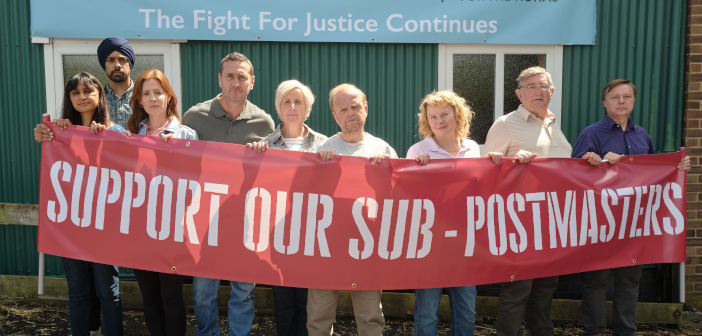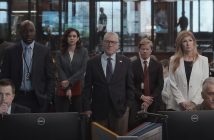With over 50 years as a director of stage and screen, our Media, TV and Film Correspondent, Paul Joyce, casts his director’s gaze over ITV’s recent drama, Mr Bates vs The Post Office, and ponders on television’s ability to influence public opinion…
I have taken a personal interest in Toby Jones’ career since we met, only the once and an occasion he will certainly not recall as he was only nine months old and fast asleep for the duration of my visit. His father, the legendary character actor Freddie Jones, had invited me to his London flat to discuss appearing in my first ever film, a totally illegal and unauthorised adaptation of a short theatre piece by Samuel Beckett (Act Without Words). For reasons which still escape me, Freddie had agreed to star in the film, which we were about to shoot on a rubbish tip in Rainham, Essex. After our meeting, which we in the profession would call a ‘script conference,’ even though there was to be no dialogue in the film, he beckoned me into the bedroom to inspect the young Toby, a chubby-faced baby looking much like he does now (with about the same amount of hair). Since then I have watched his career flower from the male equivalent of a young ingenue to his current crop of youthful old men.
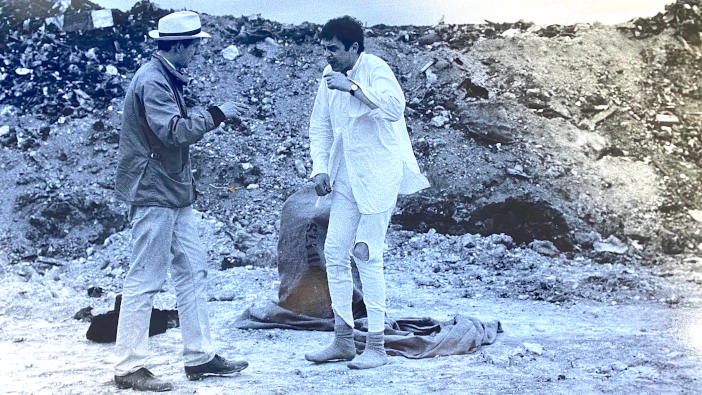
Paul Joyce (left) directing Freddie Jones in The Goad (1966), adapted (with permission) from Samuel Beckett’s ‘Act Without Words II’.
The recent acclaimed ITV Production of Mr Bates vs The Post Office in which Toby plays the eponymous lead, led me to speculate on the power of television and film to concentrate public opinion on real events which for many diverse reasons may have been ignored, or as in this case, swept under the carpet. Over three nights the writer took us across a total of 8 cases involving death, dishonour, and most frighteningly, disbelief. Within 48 hours of the final part being transmitted, questions were asked in the House of Commons, prompting a rapid statement from our Prime Minister which indicated he agreed that the CBE given and firmly accepted by the ex-Post Office head, Paula Vennell, should be summarily torn from her grasp (she has now relinquished it).
I have seen Toby portray, in varying shades of genius, Alfred Hitchcock, Truman Capote, Claudius Templesmith in The Hunger Games, and most impressive of all (for me at least) the lead of Gilderoy in Berberian Sound Studio, the latter being an idiosyncratic masterpiece. On TV he inhabited his role in the magnificent Detectorists with depths of feeling and emotion well beyond the ken of most sitcoms. But here, in Mr Bates he was asked to take on perhaps the most challenging role of all, to play an entirely ordinary, and frankly, one hundred percent boring man.
And there to prove my point in countless interview was the real Mr Bates, economical of wordage, apparently unmoved by twenty-three years or so of battling variegated authorities, lawyers, committees, corporations, the Post Office and the manufacturer of the flawed software at the very heart of the story, Fujitsu themselves. And all without a trace of what Toby can bring to the table in spades: humour. So even though I have worked with and directed many great actors after Freddie Jones (Paul Scofield, Dirk Bogarde, Max Wall, John Hurt, David Warner, Prunella Scales, etc) I am left frankly bemused by his performance. Was he here at the peak of his powers, or just walking though it? Watching the real Mr Bates himself walking his way through countless interviews, answering the same questions again and again, it finally dawned on me that Toby’s performance had me truly fooled; for there in front of me in all his well-deserved glory, stood a man of honour, and as plain and boring as the day is long. In my opinion a BAFTA winning portrayal, without a doubt.
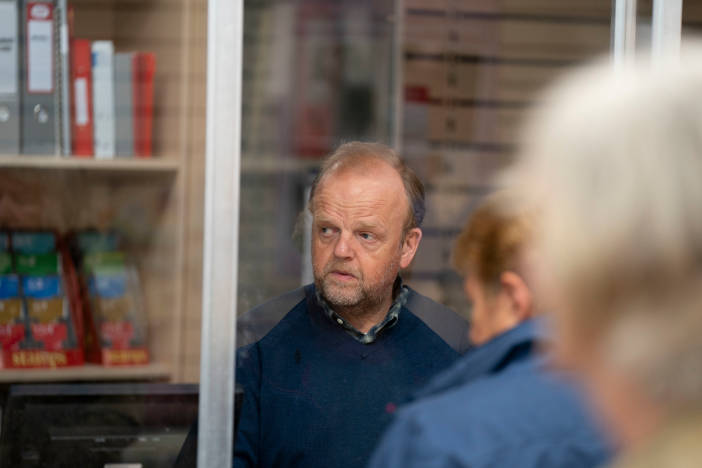
Toby Jones as Mr Bates
For me, at least, television came of age as a serious medium in 1966 with the ground-breaking documentary-drama Cathy Come Home, marking Ken Loach’s entry into the path of directorial greats. Focusing on a young couple, the film pursues a trajectory where the outcome is indeed tragic, but the results of the film’s transmission on national TV was nothing short of sensational. The film follows Cathy and Reg as they seek to establish both a working relationship, and then a family in the face of indifference, hostility and finally, gut-wrenching cruelty on the part of the state. Unable to find or afford accommodation, they become basically stateless, abandoned by an indifferent establishment, despite the fact that not so long before a British Prime Minister had declared, “You have never had it so good!” A public outcry followed the initial screening and the quickly-scheduled repeat. Just months afterwards, the charity Crisis was established, bringing hope, compassion and practical help to thousands of people who, like Cathy, had lost friends, family and their children as a result of having no real place to go. Suddenly, television was not just a black and white box in the corner spewing out Match of the Day and Coronation Street. It had truly thrust itself into the modern age.
At the same time the BBC were trying to deal with the ramifications of Cathy, they were presented with another problem, again entirely of their own making. One of their legendary staffers was a commissioning editor named Huw Wheldon who had virtually single-handedly brought the BBC into today’s world in terms of contemporary coverage of all the arts. He also had a great ability to find new and talented directors, such as Ken Russell, and especially the hero of this next tale, Peter Watkins. Watkins then was a no-holds-barred basically unstoppable TV auteur (before that phrase had even been invented) who seemed not to need sleep or even food in the pursuit of a filmic vision which time and lack of resources did not in any respect dim. He had just made an astonishing drama-documentary called Colloden, dealing with the flight of Bonnie Prince Charlie and the subsequent bloody battle, followed by his five-month scramble to keep ahead of the English forces before legging it to France. It should have been clear to the BBC, given Watkin’s portrayal of the British Establishment and especially the army, that here was a pure Republican by nature and once let loose in the BBC would undoubtedly wreak havoc in all departments.
And this is precisely what happened. His depiction of the results of a nuclear attack in Britain was instantly impounded and banned by the BBC. This despite the fact that the Campaign for Nuclear Disarmament had only recently been formed and was already a powerful lobby, even within the Establishment itself (the philosopher Bertrand Russell was a founder member). The difficulty of even obtaining pirate versions raised the film immediately to legendary status, and although the BFI were reluctantly allowed a single screening some years later, it was over 20 years before the BBC relented and permitted its transmission. I think it would be fair to say that this film changed the nature and direction of the nuclear disarmament movement forever. Without even realising it, the BBC had taken one more step towards maturity and now, in all practical terms, had earned the keys to the front door. But to whom should they hand them?
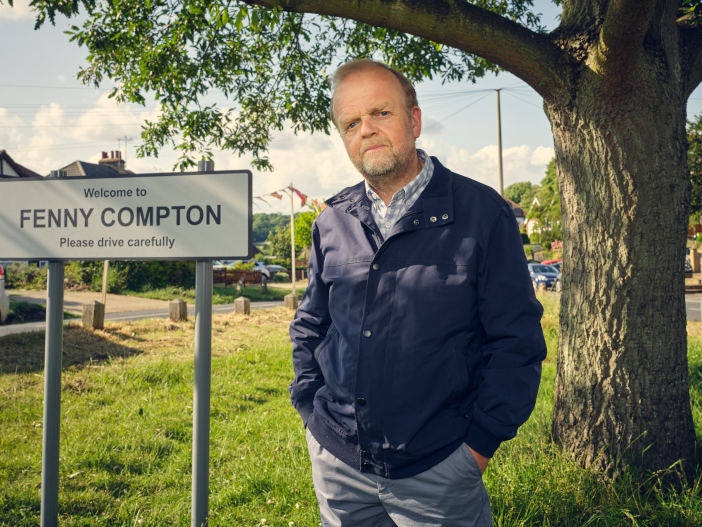
No ideas? Well, I have. One David Rose, a BBC stalwart who went on to found ‘Film on 4’ at Channel 4 and subsequently commission 150 films of international renown, including work from such directors as Andrei Tarkovsky and Wim Wenders. When the opening for Controller of British Regional Television presented itself to him, he grabbed it with both hands and set up his offices at Pebble Mill, Birmingham, which was to become a byword for innovative TV dramas. His earlier time at the BBC giving birth to, amongst others, Z Cars, gave him the currency to directly commission hard-hitting contemporary dramas, which he did almost immediately, establishing ‘The Mill’ as THE place to work and, at the famous bar, to be seen. There he nurtured such talents as David Hare (Licking Hitler) and Mike Leigh (Abigail’s Party) and was reprimanded for commissioning Ian McEwen’s Solid Geometry in which a pickled penis, once unstoppered, became the focus of a philosophical debate (production cancelled). In the meantime, a Play for Today slipped through almost unnoticed by a newish writer, Alan Bleasdale. Not much attention was wasted on a tale of half a dozen northern unemployables who slapped down tarmac road coatings with little thought about the longevity of their work. However, Rose saw the potential in developing the film into a five-part series, one episode concentrating on each character, which he duly commissioned and the ‘Yosser’ episode went, as they say today, viral.
Boys from the Blackstuff came at a time when there was still a Royale Family type sense of occasion (frequently nightly) of communal TV watching, which now might be referred to as ‘binging.’ Almost immediately, Josser’s catchphrases, “Gizza’ job!” (translation: “give us a job”) and “I can do that!” became bywords and are now bedded into our contemporary English language. In 1982 on its first transmission, it was immediately re-scheduled for a repeat only nine weeks later, and in 2000 was placed seventh in the best TV programmes of the 20th Century. By concentrating on one character in each episode, Bleasdale was able to fully explore the themes of emotional and mental insecurity in an uncaring and acquisitive society where unemployment and deprivation were watchwords for most of those living north of Watford.

Shaun Dooley as Rudkin and Matt Ayleigh as George in ‘Mr Bates vs The Post Office’
The writer Dennis Potter once referred to television as the means a nation talks to itself, but here it was a single programme which did so, and which many saw as a critique of Margaret Thatcher, whereas in fact the scripts were mostly written before she became PM. In the decade before its transmission in 1982, 80,000 people had lost their jobs in the story’s setting, Liverpool, and redundancy there had reached 25%. In an economic climate which the then Chancellor, Geoffrey Howe, described as a “managed decline,” i.e the wrecking of trade unions and vandalising the public purse, Thatcher’s great ally, Norman Tebbit, described the films as “defeatist.” Well, it was not to be long before the Tory’s themselves were defeated, heralding an unprecedented time for Labour to remain in office. Thus, these are some of the destinations reached when a nation engages in a dialogue with itself.
Before leaving this somewhat sketchy survey of key moments in TV drama history, I feel The Crown cannot go unmentioned. A series which well outlasted the very Queen who figured in most episodes, it has finally announced its imminent closure with many royal threads still wafting about in the breeze. Harry, Megan, Andrew? A great series which started as compulsive viewing and then (for me at least) morphed into a box of Quality Street into which one could occasionally dip a restless hand, or even eye. But I would not be without these decades old reminders that one’s ordinary life is really not that bad at all; at least when compared with the ex-owner of Harrods or the prince who inhabits a rabbit hutch on his brother’s estate. If you really want to understand levelling up, just press the button, and don’t forget to record and wipe interruptions, or simply pay more and cancel the ads.
Mr Bates vs The Post Office is available to stream on ITVX. Photos courtesy of ITV Studios.
The author, Paul Joyce, is a director, photographer and artist, with over 50 years in film and television. For more information, visit his website.

